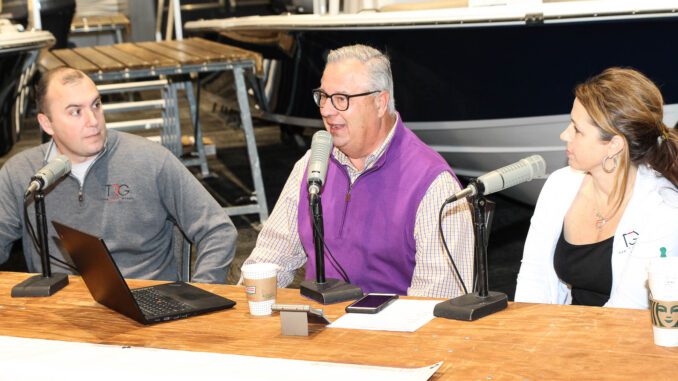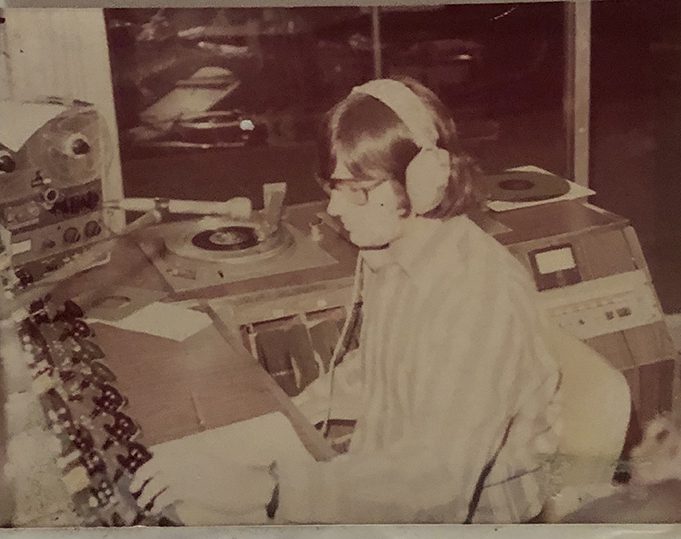
RALEIGH — In eastern North Carolina, Henry Hinton’s voice is a familiar one — one that area families have heard introduce their favorite songs, provide play-by-play for college sporting events and interview major politicians for decades. Now an inductee into the North Carolina Broadcasters Hall of Fame and the owner of multiple stations along the state’s coast, Hinton spoke with North State Journal about his lifelong passion for radio.
Even as a “country boy” growing up in Chowan County, a rural area in the northeast of the state, Hinton said he spent as much time as he could around broadcasting.
“We had a little community radio station in Edenton where Mom used to drop me off in the afternoons. I don’t know why, but I just had a love for music and radio,” Hinton remembered. “I would just hang around the radio station and help the disc jockeys there, do whatever they told me, pull AP Wire copy or get them coffee, or whatever. And I just kind of got bitten by the radio bug.”

Living just below the Virginia line, the community would also listen to WGH out of Norfolk, Virginia. The station, as Hinton describes it, was a very big deal in that era, and its radio personalities were early heroes for him.
While radio was a passion, so were sports — especially East Carolina University sports — and he always thought he was going to be a baseball or football coach. But opportunities to be involved in radio kept presenting themselves.
“When I went to ECU, I got involved with a campus radio station and got hired by a local station in Greenville,” Hinton said.
But an even bigger opportunity presented itself after Hinton and his girlfriend visited his parents in Norfolk for the weekend. To pass the time, they went to a mall, and there was a showcase of the WGH radio station he had grown up listening to. He noticed a big star, Jeff Davis, was behind the mic and didn’t want to lose his chance to meet him.
“Jeff Davis was on the air, and I slapped a note up on the window that said, ‘I’m a disc jockey in Greenville, North Carolina.’ Well, he invited me in, which was against the rules, of course. But I got to know Jeff, and he wanted to hear what I sounded like on the air. So, I gave him a tape and, amazingly, like a week later, I got a call from the program director of the station saying, ‘Would you be interested in a job?’”
Hinton says WGH was the biggest radio station between Atlanta and D.C. at the time, so it was not only a chance to connect with his childhood heroes but also to network with many who would go on to be national stars. He was still in college at ECU, though, so he had to spend his senior year driving back and forth between Greenville and Norfolk to do his classwork and his duties at the Top 40 music station.
When school was done, Hinton decided to go to graduate school at ECU, he said mainly to be around his girlfriend, whom he married shortly after.
“But then I ran out of money for grad school and found myself back at the local station,” Hinton recalled, saying a friend and mentor, Danny Jacobson, owned the station. “Danny offered me a job, and I needed to make money, so he said, ‘Why don’t you work in ad sales? You can be on the air and do ad sales.’”
Hinton said he realized he had a knack for selling ads and for being on air, so he decided to go all-in on radio and forget about grad school or dreams of coaching. He began by covering ECU sports on the radio and selling ads for a local television station. That was when another opportunity arose when Chapel Hill radio legend Jim Heavner took notice of Hinton and offered him a job at WCHL, the Tar Heel Sports Network, as Woody Durham’s “color man.”
“My first broadcast on the air, I called Kenan Stadium ‘Ficklen Stadium’ [the name of ECU’s stadium], and I thought my career was finished as a Tar Heel Network guy right there,” Hinton said. “I remember the look that Woody Durham shot me in the booth at Kenan Stadium, and I thought, ‘Oh my God.’”
But he stayed and was able to mingle with the likes of Michael Jordan and Dean Smith. Smith and Hinton even attended church together and had their children play together.
Hinton said, “I feel like I’ve lived a Forrest Gump life because I’ve been around all these influential people.”
Heavner bought a radio station out of Burlington and transferred it to Raleigh, and he wanted Hinton to run it. Hinton accepted and stayed at WZZU in Raleigh, known as 94Z, for a couple years. But he began looking for a way to head back to small-town eastern North Carolina and to get back to covering college sports.
And he didn’t have to wait long for this opportunity to arise. In 1989, his high school baseball coach, Harry Land, who was a successful auto dealer in the Triangle area, offered to help him buy radio stations in eastern North Carolina. Ultimately, they bought three together, giving Hinton his chance to return home and to advance his career from on-air talent and manager to owner.
While all the stations were music stations, they wanted to use at least one for conservative political talk, which was extremely popular at the time. Unable to get Rush Limbaugh or other big names, they created a partnership with G. Gordon Liddy of Watergate fame.
“Gordon Liddy was really the reason that I ended up getting into talk radio,” Hinton said, calling Liddy a “great, great human being” and a close friend.
Hinton added some local talk people around Liddy, including his own show, but then, in 2003, they received an offer that was “too good to turn down.” Archway, a big company out of Atlanta, offered to buy his three stations, and even though he hadn’t been thinking of selling, he did. Rather than keep the successful format that Hinton had built, though, Archway’s program director in Boston said they were turning it into a country music station.
Hinton kept his show going on his friend George Beasley’s AM station from 2004 to 2007, but it was a single 50,000-watt station. As fate would have it, Archway “crashed and burned,” giving him an opportunity to buy back his stations.
Don Curtis from Curtis Media Group in Raleigh, worked with Hinton to buy four of Archway’s five stations for $4.5 million, much less than the $9 million they had originally asked for, after negotiations. Hinton and his son partnered with Don Curtis to own and operate these stations from 2007 to 2017. When the Beasleys also decided to liquidate their radio holdings in eastern North Carolina, Curtis and Hinton decided to buy again. Because of FCC rules, they could each only own five of the 10, so they split them up.
With these five stations, Hinton decided not to do as much Top 40 and sports as he had done coming up, and instead to focus on the growing political talk market.

“Somewhere along the way, I can tell you, we decided that we were going to go full bore into the conservative talk. And I just wanted to get Rush Limbaugh. And after we bought the Archway group out, I ended up with two 100,000-watt radio stations. One that covered everything from the Virginia line to New Bern and another that covered everything from New Bern to Wilmington.”
The rights to Limbaugh’s show were owned by Premier Radio out of New York, and they had given the local contract to one small AM station that otherwise played sports. Hinton thought he could convince Premier’s president, Peter Tripi, that his stations would be a better fit, so he called him and made the pitch.
“Just off the top of my head, I said, ‘You know what, I’m going to be in New York in a couple weeks.’ Which was a total lie. And I said, ‘What if I come up and we go to lunch and talk about this, and I’ll tell you about the market and tell you what I think we can do to increase Rush Limbaugh’s brand in eastern North Carolina?’”
And he did. At the meeting at a high-end Manhattan steakhouse, Hinton not only got rights to Limbaugh’s show for the area, but Glenn Beck’s and Sean Hannity’s.
“And talk radio was at its peak; it was just killing it,” Hinton said. “And, of course, that made my show bigger.”
Hinton’s own show was now running alongside these national names and was being well-received. He was initially unsure people from New Bern and further south would listen in, since he had not been introduced to this area as much.
“I’m just very humbled at how it’s been accepted in the whole eastern North Carolina region,” Hinton said of his show, which he said has evolved from being a mostly locally focused show to covering state and federal news as well.
Being the main talk product in the eastern part of the state has put him on a first-name basis with politicians who want to reach his audience, which includes statewide candidates for Senate or governor, local candidates and even those running for president.
But Hinton is clear that he did not get all these opportunities or arrive where he is today by himself.
“Nobody is successful on their own,” Hinton said. He especially credits three men for helping his rise: Harry Land, the former baseball coach who bought his first stations with him; Heavner, the legendary owner of the Tar Heel Sports Network who taught him how to run stations; and Don Curtis, his business partner in buying the later stations, who Hinton calls “such a good human being.”
“So those three guys are why I’m successful, I think.”
As someone who has covered both sports and politics since the 1970s, Hinton does not think either is in a good place right now. He said in the Republican Party, there is a dynamic of “You either agree with 100% of the ideology or you become my enemy.” And he said he is “absolutely devastated” about the direction of college sports, saying both money and politics are making it all fall apart.
Radio, however, is one thing that Hinton said is still going strong and can be a source of unity for communities.
“Radio is not going anywhere,” Hinton said. “No other media, no other internet media, no other broadcast media can do what radio does. It’s always going to survive; it’s always going to be strong. Our stations are stronger than ever. Last year was a challenge with COVID, but right now we’re back on par. We’re having record months. And radio is part of the community; that is the fabric of radio and why it succeeds and why it will succeed because we’re part of the community and people see us in their lives. And we’re not going anywhere.”


